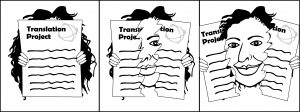Translation Agency Tips: #46: Splitting a Translation Project

Often large translation and urgent projects will need to be split between different translators to ensure a deadline is met. Here are few pointers on things to look out for when working on a job which has been split.
Consistency in a Large Translation
Naturally the greatest issues with split translations involve the terminology and consistency of the translations, which will be affected by having more than one person working on the materials. The best thing we can do is to try and limit this as much as possible. Hopefully the client will be having the large translation proofread which will add some consistency to the overall translation. Then again, maybe the translation is for information purposes only and consistency is not too important? This is worth checking because then you won’t have to worry too much about the consistency the terminology and style.
If it is important, maybe ask to be put in touch with the other translators working on the job. We would usually ask translators are comfortable with this. Then terminology and stylistic choices can be discussed. You can also help each other with any queries you might have. Fundamentally, it is the Project Manager (or whoever is heading up the project) who is responsible for making the translation as consistent as possible, so you probably shouldn’t worry too much about consistency anyway, but I know how conscientious and proud of their work most translators are so thought it was worth including!
Translation Memory
Request a Translation Memory or a glossary. If the client doesn’t have something like this, hopefully some reference material or similar materials they’ve had translated previously would be useful. This should give you a good starting point.
Formatting
Something else to consider is the formatting. If you’re working on a single large document which has been split up into different sections, consider how the translations will be pieced back together at the end of the project. Hopefully the materials will be fairly straightforward to format. If not, talk to the project leader about this. In most cases both they and the end client would rather you spent more time on the translations and less time on the formatting, so you should be able to come to a compromise.
Contents pages and page numbering can cause problems so I would leave these until the end, and it’s probably worth asking the client if these can be left altogether. Sometimes (especially in Word) contents pages pull the information from the titles of chapters/sections automatically. However when a large document is split up, translated, and pasted back together again in the new language, this can cause issues. It will depend on how the project leader wants to handle it. But be aware that this could create an issue.
Have we missed anything? Please leave a comment if you have anything to add!














